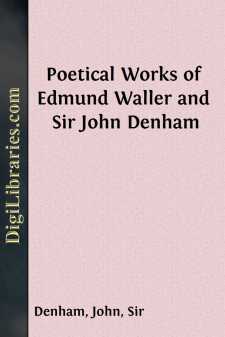Categories
- Antiques & Collectibles 13
- Architecture 36
- Art 48
- Bibles 22
- Biography & Autobiography 813
- Body, Mind & Spirit 142
- Business & Economics 28
- Children's Books 17
- Children's Fiction 14
- Computers 4
- Cooking 94
- Crafts & Hobbies 4
- Drama 346
- Education 46
- Family & Relationships 57
- Fiction 11829
- Games 19
- Gardening 17
- Health & Fitness 34
- History 1377
- House & Home 1
- Humor 147
- Juvenile Fiction 1873
- Juvenile Nonfiction 202
- Language Arts & Disciplines 88
- Law 16
- Literary Collections 686
- Literary Criticism 179
- Mathematics 13
- Medical 41
- Music 40
- Nature 179
- Non-Classifiable 1768
- Performing Arts 7
- Periodicals 1453
- Philosophy 64
- Photography 2
- Poetry 896
- Political Science 203
- Psychology 42
- Reference 154
- Religion 513
- Science 126
- Self-Help 84
- Social Science 81
- Sports & Recreation 34
- Study Aids 3
- Technology & Engineering 59
- Transportation 23
- Travel 463
- True Crime 29
Poetical Works of Edmund Waller and Sir John Denham
by: John Denham
Description:
Excerpt
THE
LIFE OF EDMUND WALLER.
It is too true, after all, that the lives of poets are not, in general, very interesting. Could we, indeed, trace the private workings of their souls, and read the pages of their mental and moral development, no biographies could be richer in instruction, and even entertainment, than those of our greater bards. The inner life of every true poet must be poetical. But in proportion to the romance of their souls' story, is often the commonplace of their outward career. There have been poets, however, whose lives are quite as readable and as instructive as their poetry, and have even shed a reflex and powerful interest on their writings. The interest of such lives has, in general, proceeded either from the extraordinary misfortunes of the bard, or from his extremely bad morals, or from his strange personal idiosyncrasy, or from his being involved in the political or religious conflicts of his age. The life of Milton, for instance, is rendered intensely interesting from his connexion with the public affairs of his critical and solemn era. The life of Johnson is made readable from his peculiar conformation of body, his bear-like manners, his oddities, and his early struggles. You devour the life of Gifford, not because he was a poet, but because he was a shoemaker; and that of Byron, more on account of his vices, his peerage, and his domestic unhappiness, than for the sake of his poetry. And in Waller, too, you feel some supplemental interest, because he united what are usually thought the incompatible characters of a poet and a political plotter, and very nearly reached the altitudes of the gallows as well as those of Parnassus.
March 1605 was the date, and Coleshill, in Hertfordshire, the place, of the birth of our poet. He was of an ancient and honourable family originally from Kent, some members of which were distinguished for their wealth and others for the valour with which, at Agincourt and elsewhere, they fought the battles of their country. Robert Waller, the poet's father, inherited from Edmund, his father, the lands of Beaconsfield, in Bucks, and other territory in Hertfordshire. These had been in 1548-9 left by Francis Waller, in default of issue by his own wife, to his brothers Thomas and Edmund, but Thomas dying, Edmund inherited the whole. Robert, on receiving his estates, quitted the profession of the law, to which he had attached himself, and spent the rest of his life chiefly at Beaconsfield, employed in the manly business and healthy amusements of a country gentleman. He died in August 1616, and left a widow and a son—the son, Edmund, being eleven years of age. It was at Beaconsfield. We need hardly remind our readers, that a far greater Edmund—Edmund Burke—spent many of his days. It was there that he composed his latest and noblest works, the "Reflections on the French Revolution," and the "Letters on a Regicide Peace;" and there he surrendered to the Creator one of the subtlest, strongest, brightest, and best of human souls....


